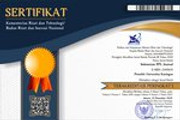FOSTERING STUDENTS’ CRITICAL THINKING SKILLS THROUGH HIGH-LEVEL QUESTIONING IN ANALYTICAL EXPOSITION TEXT
Abstract
This study employed classroom action research and was conducted in two cycles. The main data were students’ written texts taken from the first cycle and the second cycle, and the teacher’s field notes. The texts were analyzed by examining the schematic structure and the linguistic features of an analytical exposition text. To measure students’ critical thinking, the texts were examined using the Critical Thinking Value Rubric developed by the Association of American Colleges and Universities (AACU). The findings showed that there are positive implications for the application of high-level questioning in students’ critical thinking skills. Furthermore, in comparison between the data gained in the first cycle and the second cycle, it shows that after the implementation of high-level questioning there are some improvements in all aspects of the critical thinking criteria such as issue, evidence, the influence of context, and conclusion based on the value rubric. Although there are some improvements, in terms of delivering the issue, and showing evidence, the students still have difficulties in explaining and elaborating their ideas clearly.
Keywords: analytical exposition text; critical thinking; high-level questioning.
Full Text:
PDFReferences
Ali, G., & Awan, R.-N. (2021). Thinking-based instructional practices and academic achievement of undergraduate science students: Exploring the role of critical thinking skills and dispositions. Journal of Innovative Sciences, 7(1), 56–70. https://doi.org/10.17582/journal.jis/2021/7.1.56.70
Barnett, R. (2017). A curriculum for critical being. In Martin Davies, and Ron Barnett (eds), The Palgrave handbook of critical thinking in higher education (pp. 63–76). New York: Palgrave Macmillan
Cohen, L. (2007). Research methods in education. Routledge.
Emilia, E. (2005). A critical gender-based approach to teaching academic writing in a tertiary EFL context in Indonesia (Unpublished doctoral thesis). Melbourne University, Australia.
Fisher, R. (2001). Philosophy in primary schools: Fostering thinking skills and literacy. Literacy, 35(2), 67-73.
Gustine, G. G. (2014). Critical literacy in an Indonesian EFL setting: Sustaining professional learning (Doctoral thesis). Deakin University, Australia. Retrieved from dro.deakin.edu.au/DU:300673.
Hamied, F. A. (2017). Research method: A guide for first-time researchers. UPI Press.
Kress, G. (2003). Literacy in the new media age. Psychology Press.
Mills, K., & Dooley, K. (2014). Teaching persuasive texts: Building a language of evaluation through hedging and moderated intensification. Literacy Learning: The Middle Years, 22(3), 33.
Morales-Obod, M., Valdez Remirez, M. N., Satria, E., & Indriani, D. E. (2020). Effectiveness on the use of mother tongue in teaching the concepts of fraction among second grade of elementary school pupils. Journal for the Education of Gifted Young Scientists, 8(1), 291–304. https://doi.org/10.17478/JEGYS.637002
Park, C. (2003). Engaging students in the learning process: The learning journal. Journal of Geography in Higher Education, 27(2), 183–199.
Ramlal, A., and Augustin, D. S. (2020). Engaging students in reflective writing: An action research project. Educational Action Research, 28(3), 518–533. doi:10.1080/09650792.2019.1595079
Remark, A. A., & Ewing, E. M. (2015). Use of high-level questioning to increase student achievement in reading. (Master thesis, St. Catherine University, Sophia). Retrieved from https://sophia.stkate.edu/maed/127
Rhodes, T. (2009). Assessing outcomes and improving achievement: Tips and tools for using the rubrics. Washington, DC: Association of American Colleges and Universities.
Shaw, A. (2019). Thinking critically about critical thinking: Validating the Russian Heighten critical thinking assessment. Studies in Higher Education, 45 (9), 1933-1948. https://doi.org/10.1080/03075079.2019.1672640.
Simmons, M., et al (2021). Reflection as pedagogy in action research. Educational Action Research, 29(2), 245-258. https://doi.org/10.1080/09650792.2021.1886960
Ulger, K. (2018). The effect of problem-based learning on the creative thinking and critical thinking disposition of students in visual arts education. Interdisciplinary Journal of Problem-Based Learning, 12(1), 1-19. https://doi.org/10.7771/1541-5015.1649
Tiruneh, D. T., Verburgh, A., & Elen, J. (2014). Effectiveness of critical thinking instruction in higher education: A systematic review of intervention studies. Higher Education Studies, 4(1), 1-17.
DOI: https://doi.org/10.25134/ieflj.v8i2.6437
Refbacks
- There are currently no refbacks.

This work is licensed under a Creative Commons Attribution-ShareAlike 4.0 International License.

